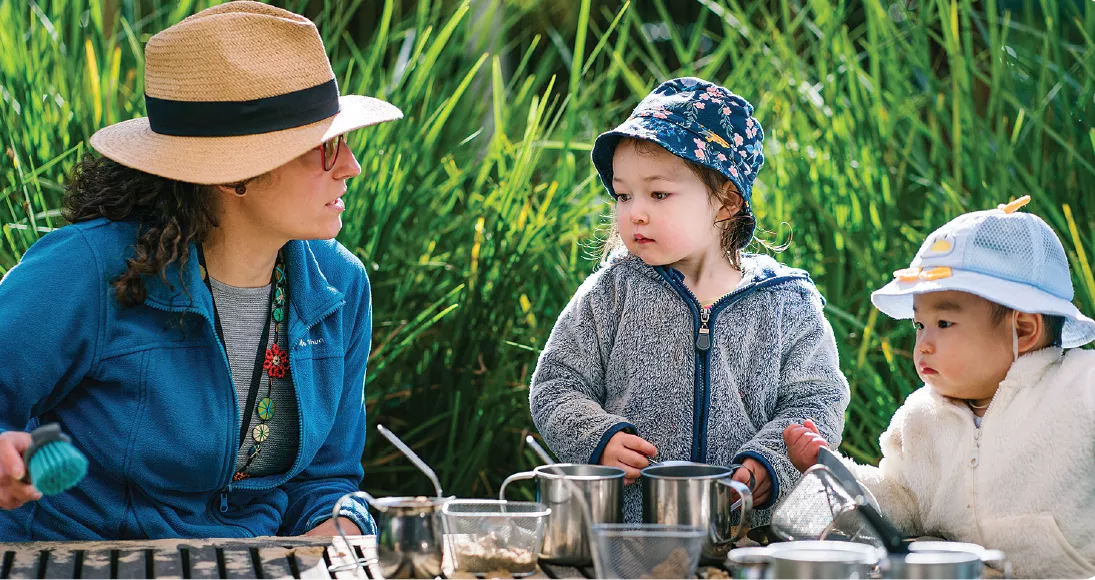- Home
- BELONGING, BEING & BECOMING - THE EARLY YEARS LEARNING FRAMEWORK
- (EYLF) PRACTICES
- (EYLF) Play-based learning and intentionality
Table of contents
- BELONGING, BEING & BECOMING - THE EARLY YEARS LEARNING FRAMEWORK
- (EYLF) INTRODUCTION
- (EYLF) A VISION FOR CHILDREN'S LEARNING
- (EYLF) ELEMENTS OF THE EARLY YEARS LEARNING FRAMEWORK
- (EYLF) EARLY CHILDHOOD PEDAGOGY
- (EYLF) PRINCIPLES
-
(EYLF) PRACTICES
- (EYLF) Holistic, integrated and interconnected approaches
- (EYLF) Responsiveness to children
- (EYLF) Play-based learning and intentionality
- (EYLF) Learning environments
- (EYLF) Cultural responsiveness
- (EYLF) Continuity of learning and transitions
- (EYLF) Assessment and evaluation for learning, development and wellbeing
- (EYLF) THE EARLY YEARS LEARNING FRAMEWORK PLANNING CYCLE
- (EYLF) LEARNING OUTCOMES
- (EYLF) GLOSSARY OF TERMS
- (EYLF) REFERENCES
Need help using the guide? Visit our help section.
(EYLF) Play-based learning and intentionality
Play-based learning approaches allow for different types of play and recognise the intentional roles that both children and educators may take in children’s learning. When children play with other children and interact with adults, they create relationships and friendships, test out ideas, challenge each other’s thinking and build new understandings. Play provides both a context (a place or space where children play) and a process (a way of learning and teaching) where children can ask questions, solve problems and engage in critical thinking. Play-based learning provides opportunities for children to learn as they discover, create, improvise and imagine.
Play-based learning with intentionality can expand children’s thinking and enhance their desire to know and to learn, promoting positive dispositions towards learning.

Children act intentionally and with agency in play. This is demonstrated when children make decisions, and with what and with whom to engage and invite into their play. Neural pathways and connections in the brain are stimulated when children are fully engaged in their play as they make plans, create characters, solve problems, develop self-awareness and learn how to socialise, negotiate and think with others. Children’s immersion in their play illustrates how play enables them to simply enjoy being.
Educators are intentional in all aspects of the curriculum and act deliberately, thoughtfully and purposefully to support children’s learning through play. They recognise that learning occurs in social contexts and that joint attention, interactions, conversations and shared thinking are vitally important for learning.
Educators act with intentionality in play-based learning when they, for example:
- plan and create environments both indoor and outdoor that promote and support different types of play for children’s active engagement, agency, problem solving, curiosity, creativity and exploration
- take different roles in children’s play or make purposeful decisions about when to observe and when to join and guide the play
- extend children’s learning using intentional teaching strategies such as asking questions, explaining, modelling, speculating, inquiring and demonstrating to extend children’s knowledge, skills and enjoyment in thinking and learning
- sustain, extend, challenge and deepen children’s ideas and skills through shared thinking and scaffolding learning
- use a range of strategies to plan, document and assess children’s learning in play-based experiences
- plan and implement worthwhile play-based learning experiences using children’s interests, curiosities and funds of knowledge
- assist children to recognise unfair play and offer constructive ways to build a caring, fair and inclusive learning community
- act as resourceful and respectful co-learners and collaborators with children
- support children’s progress in play-based learning through the thoughtful extension of children’s knowledge, skills and concept development
- notice and work sensitively with very young children’s intentions in exploring, practicing and experimenting through play
- acknowledge children’s enjoyment and sense of fun and playfulness in learning, particularly when engaged in group play
- provide a balance between child-led and adult initiated and guided play
- plan opportunities for intentional knowledge building, as well as recognising and utilising opportunities for spontaneous teaching and learning
- use routines, rituals and transitions to foster learning, development and wellbeing
- join in with children’s play experiences, such as taking a role in children’s pretend play, to understand and build on children’s ideas to support and foster learning
- facilitate the integration of popular culture, media and digital technologies which add to children’s multimodal play.